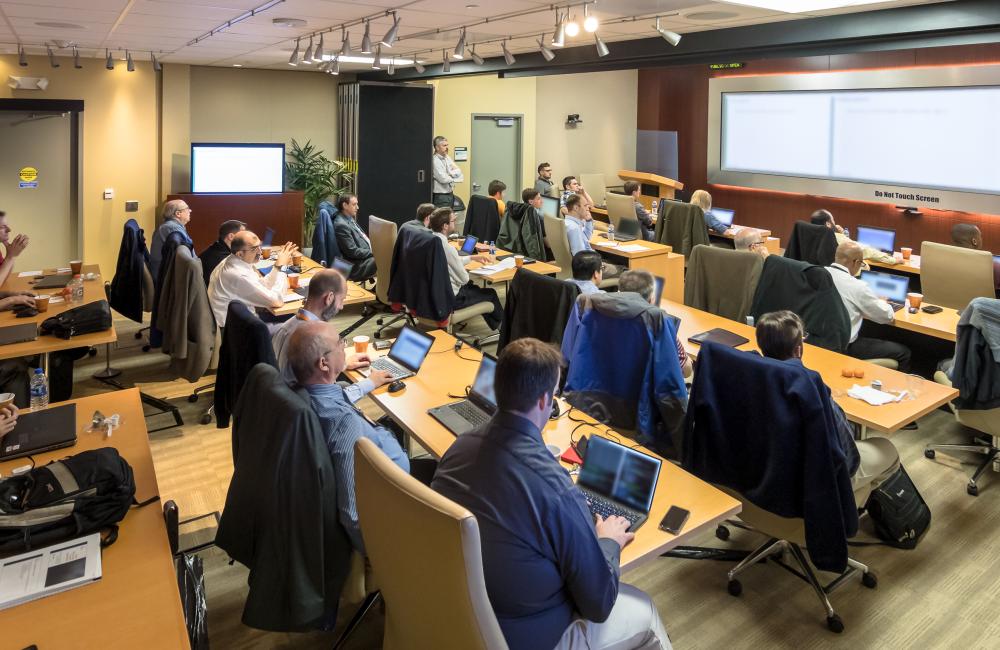Members of VERA Users Group undergo training for the software suite last fall. Credit: Carlos Jones/Oak Ridge National Laboratory, U.S. Dept. of Energy
OAK RIDGE, Tenn., March 24, 2020 — A software package, 10 years in the making, that can predict the behavior of nuclear reactors’ cores with stunning accuracy has been licensed commercially for the first time.
The nonprofit Electric Power Research Institute (EPRI) is the first to hold a commercial license for the Virtual Environment for Reactor Applications, or VERA, a set of tools developed by the U.S. Department of Energy’s Consortium for the Advanced Simulation of Light Water Reactors (CASL).
“EPRI, one of our core CASL industry partners, now has the right to use VERA to perform services for its member utilities,” said Dave Kropaczek, CASL director. “Our partners in the nuclear industry wanted software that was proven and usable, and that’s exactly what we’ve produced.”
CASL is a partnership of the DOE national laboratories, universities and nuclear industry companies working together to find solutions to specific challenges of efficiently operating nuclear reactors. Based at Oak Ridge National Laboratory and established in 2010, CASL was the first DOE Energy Innovation Hub.
The VERA software suite is a collection of interfacing codes that can simulate reactor core behavior from the large-scale down to the molecular scale. “By licensing VERA to EPRI, CASL is delivering a first step in handing its work off to industry,” Kropaczek said.
“This is a significant moment for CASL and demonstrates VERA’s value to the nuclear industry. As we look to execute additional licensing agreements with other partners, it’s important to remember the hard work of hundreds of CASL contributors in making this possible.”
“EPRI’s mission is to advance safe, reliable, affordable and environmentally responsible electricity,” said Erik Mader, Technical Executive with EPRI Nuclear Fuels and Executive Director of the CASL Industry Council. “VERA’s coupled multiphysics modeling and simulation tools can be used to better inform operating performance, safety margins and transient behavior in nuclear power plants. This could improve plant operator decision-making, reduce uncertainty and accelerate innovation in nuclear energy.”
As the 10-year CASL project winds down this spring, the program has established the VERA Users Group, which provides training, ongoing support and access to DOE’s high-performance computing resources to perform large-scale simulations.
VERA provides advanced modeling and simulation capabilities to help address several challenges, leading to improved performance and longer lifetimes for the current reactor fleet. These include predictions of departure from nucleate boiling; growth of corrosion deposits on fuel rods; stress caused by pellet expansion; and performance of reactor parts when exposed to high temperatures and radiation.
Last year, CASL brought the VERA software suite up to Nuclear Quality Assurance-1 level in preparation for widespread industry use. The NQA-1 rating, the gold standard for the nuclear industry, signifies extensive efforts in the areas of procedures, training and software control.
For information, visit https://casl.gov/.
UT-Battelle LLC manages ORNL for DOE’s Office of Science, the single largest supporter of basic research in the physical sciences in the United States. The Office of Science is working to address some of the most pressing challenges of our time. For more information, please visit https://energy.gov/science.



